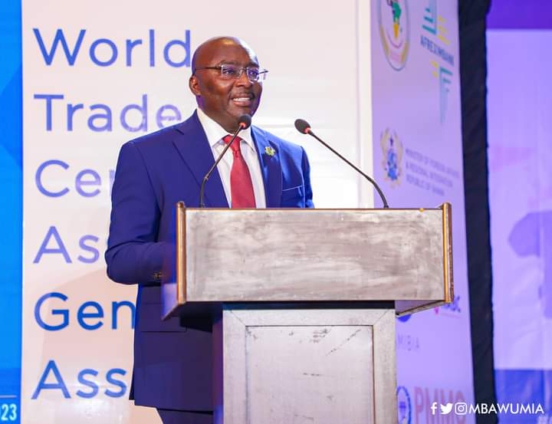Vice President Dr Mahamudu Bawumia has underscored the government's dedication to addressing challenges within the informal economy through the implementation of the Ghana Card, a vital component of the digitalisation agenda.
Speaking at the 20th edition of the Ghana Club 100 Awards on Saturday, December 9, the NPP flagbearer highlighted the negative impacts of the informal economy, such as age cheating, identity fraud, and the proliferation of counterfeit documents like insurance, birth certificates, and passports.
Dr. Bawumia emphasised the importance of transitioning from an informal economy to a more disciplined and transparent system.
He outlined the issues faced in an informal economy, including corruption, lawlessness, tax evasion, and an unbanked society. To tackle these challenges and unlock the transformative potential of the economy, he noted that the government embarked on a formalisation process.
The Vice President explained that the digitalisation initiative played a pivotal role in this formalisation process, with the Ghana Card serving as its anchor.
He added that by digitising government services through Ghana.gov.gh and other initiatives, the government aims to enhance transparency, clarity, and efficiency in the system.
Dr Bawumia stated that these measures contribute to reducing corruption, as services can be accessed without the need for bribes.
“You look at an economy in the informal sense which turned to be undisciplined, the society is undisciplined because the economy is informal and there are no consequences for bad actions, you have a society where corruption prevails, you have lawlessness, you have a tax dodging society, you have an unbanked society, you have a loan repayment dodging society, identity fraud, people assuming identities of others, lack of address systems, age cheating, fake insurance, fake birth certificates, fake passports, no functional address systems, ghost workers on government payrolls.”
“These ills of the informal economy that we really inherited made it very difficult for the economy to transform to its potential. That is why we set out to formalize the economy to make sure that the economy works in a transparent system. In that area of formalisation of the economy we realized heavily on digitalization of the economy to formalize the economy.”
Latest Stories
-
Baltasar Coin becomes first Ghanaian meme coin to hit DEX Screener at $100K market cap
16 minutes -
EC blames re-collation of disputed results on widespread lawlessness by party supporters
31 minutes -
Top 20 Ghanaian songs released in 2024
52 minutes -
Beating Messi’s Inter Miami to MLS Cup feels amazing – Joseph Paintsil
1 hour -
NDC administration will reverse all ‘last-minute’ gov’t employee promotions – Asiedu Nketiah
1 hour -
Kudus sights ‘authority and kingship’ for elephant stool celebration
1 hour -
We’ll embrace cutting-edge technologies to address emerging healthcare needs – Prof. Antwi-Kusi
2 hours -
Nana Aba Anamoah, Cwesi Oteng special guests for Philip Nai and Friends’ charity event
2 hours -
Environmental protection officers receive training on how to tackle climate change
2 hours -
CLOGSAG vows to resist partisan appointments in Civil, Local Government Service
3 hours -
Peasant Farmers Association welcomes Mahama’s move to rename Agric Ministry
3 hours -
NDC grateful to chiefs, people of Bono Region -Asiedu Nketia
3 hours -
Ban on smoking in public: FDA engages food service establishments on compliance
3 hours -
Mahama’s administration to consider opening Ghana’s Mission in Budapest
3 hours -
GEPA commits to building robust systems that empower MSMEs
3 hours

